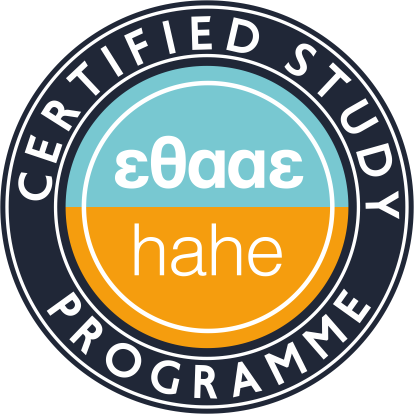1st Semester -Researching the Social World
COURSE CODE: A2-X
SELF-ENDED TEACHING ACTIVITIES
WEEKLY TEACHING HOURS 3
CREDIT UNITS 12
LANGUAGE OF TEACHING and EXAMINATION: GREEK
THE COURSE IS OFFERED TO ERASMUS STUDENTS
ELECTRONIC COURSE WEBSITE (URL) https://eclass.uth.gr/courses/ECE_P_116/
2. LEARNING OUTCOMES
Learning results
Upon successful completion of the course, students will be able to:
distinguish the basic ontological positions and epistemological approaches concerning the process of creating scientific knowledge,
recognize the different approaches to research methodology ('quantitative' and 'qualitative' direction), the different methods, as well as the different types of research design,
develop the individual steps of the research process, from the initial selection of a research interest to the final stage of writing a research report,
organize an empirical research study with coherent research questions,
evaluate issues of research methodology and ethics.
General Skills
Search, analysis and synthesis of data and information, using the necessary technologies
Adaptation to new situations
Decision making
Autonomous work
Work in an interdisciplinary environment
Generating new research ideas
Project planning and management
Exercise criticism and self-criticism
Promotion of free, creative and inductive thinking
3. COURSE CONTENT
philosophical and epistemological approaches to research methodology, basic principles of designing and conducting empirical research (quantitative and qualitative research designs), issues of validity and reliability, selection of the research topic, literature review, ethical issues,
types of quantitative designs (experimental and non-experimental designs),
types of qualitative designs (case study, phenomenological methods, grounded theory, action research, discourse analysis),
data collection (questionnaires, interviews, focus groups), and analysis of quantitative and qualitative data,
writing a research study and issues of reflexivity in the research process.
4. TEACHING AND LEARNING METHODS - ASSESSMENT
METHOD OF DELIVERY : Face to face
USE OF INFORMATION AND COMMUNICATION TECHNOLOGIES
Using PowerPoint
Posting the course material in the e-class
Using SPSS
TEACHING ORGANIZATION
Seminar:
Semester Workload
Lectures 100
Reflection activities 80
Laboratory exercises 20
Literature study & analysis 50
Writing assignments 50
Course Total (25 hours of workload per credit unit) 300
STUDENT EVALUATION
a. Critical presentation of the research plan of an article (30% of the final grade),
b. Elaboration of a written assignment in which students create a research project (70% of the final grade).
5. RECOMMENDED-BIBLIOGRAPHY
suggested Bibliography:
- Related scientific journals:
1. Greek language
Vergeti, M. K. (2017). A Guide for Writers of Scientific Texts. Thessaloniki: Kyriakidis.
Georgalidou M., Sifianou, M., & V. Tsakona. (2014). Discourse analysis: theory and applications. Athens: Nisos.
Theofilidis, X. (1995). Writing a scientific paper: from theory to practice. Athens: Dardanos.
Iosifidis, Th. (2003). Qualitative research methods in the social sciences. Athens: Critique.
Kakaboura, R. & O. E. Cassaveti. (2018). Visual ethnography and education. Athens: Pedio.
Kalfopoulos, K.Th. (Ed.). (2003). The qualitative tradition in the social sciences. Athens: Nisos.
Katsaros, E. (2016). Educational Research-Action. Multiparadigmatic Investigation for the Reformation of Educational Practice. Athens: Critique.
Kiupkiolis, A., Kosmas, Y., & I. Pekhtelidis. (2015). Theory of Speech. Athens: Gutenberg.
Lazaridou, A. (2019). The Case Study in Educational Administration. Athens: ION.
Papageorgiou, G. (1998). Methods in Sociological Research. Athens: Print.
Pigiaki, P. (1988). Ethnography: the study of the human dimension in Social and Educational Research. Athens: Grigoris.
Pourkos, M. & M. Dafermos (Eds.). (2010). Qualitative Research in the Social Sciences: Epistemological, Methodological and Ethical Issues. Athens: Place.
Roussos, P. L., & Tsaousis G. (2011). Statistics in the behavioral sciences using SPSS. Athens: Place.
Stalikas, A. (2005). Research methods in psychology. Athens: Greek Letters.
Tsiolis, S. (2014). Methods and techniques of analysis in qualitative social research. Athens: Critique.
Greek (translated)
Babie, E. (2018). Introduction to social research. Athens: Critique.
Bryman, A. (2016). Social research methods. Athens: Gutenberg.
Carr, W. &S. Kemmis. (2002). For a critical educational theory. Education, knowledge and action research. Athens: Kodikas.
Cohen, L., Manion, L. & K. Morrison. (2008). Educational Research Methodology. Athens: Metaichmio.
Christensen, L. B. (2007). The experimental method in scientific research. Athens: Papazisi Publications.
Creswell, J. W. (2011). Research in education: Design, conduct and evaluation of quantitative and qualitative research. Athens: ION.
Masson, J. (2009). Conducting qualitative research. Athens: Metaichmio. Mertens, D.M. (2009). Research and evaluation in education and psychology. Athens: Metaichmio.
Phillips, L. & Jorgensen, M. (2009). Discourse Analysis: Theory and Method. Athens: Papazisis.
Potter, J. &M. Wetherell. (2009). Reason and Social Psychology. Beyond attitudes and behavior. Athens: Metaichmio.
Robson, C. (2010). Real-world research: A tool for social scientists and professional researchers. Athens: Gutenberg.
3.Ξενόγλωσση
Bell, J. & S. Waters. (2014). Doing Your Research Project: A Guide for First-Time Researchers in Education and Social Science, 6th edition. London: OpenUniversityPress.
Clandinin, J. & M. Connelly. (2000). Narrative Inquiry: Experiences and Story in Qualitative Research. NewYork: TeachersCollegePress.
Denzin, N. K. & Y. S. Lincoln (Εds). (1998). Collecting and interpreting qualitative materials. ThousandOaks: Sage.
Denzin, N. K. & Y. S. Lincoln. (2000). Handbook of qualitative research (2nd ed.). ThousandOaks, CΑ: Sage.
Hammersley, M. (ed.). (2007). Educational Research and Evidence-based Practice. London: Sage.
Lincoln, Y. & E. Guba. (1985). Naturalistic Inquiry. NewYork: Sage.
McNiff, J. (1993). Teaching as learning: An action research approach. London: Routledge.
Patton, M. Q. (1990). Qualitative Evaluation and Research Methods.NewburyPark, CA: Sage.
Strauss, A. & J. Corbin. (1998). Basics of Qualitative Research: Techniques and Procedures for Developing Grounded Theory.ThousandOaks, CA: Sage.
Willig, C. (2008). Introducing qualitative research in psychology: Adventures in theory and method. Berkshire, England: Open University Press.
Qualitative Inquiry
https://journals.sagepub.com/home/qix
Qualitative Research
